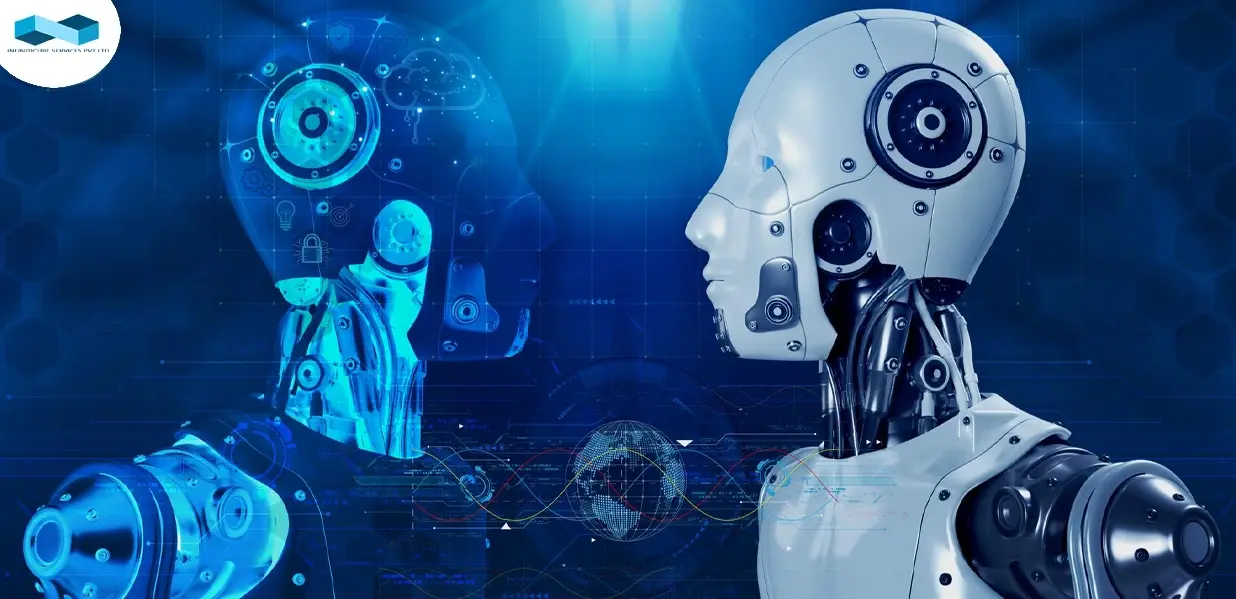AI In Retail: Changing The Future Prospects Of The Sector
In retail, physical shops still hold sway despite having to contend with intense competition. Similar to physical storefronts, online retailers compete in a market where they are only a mouse click away. In addition, the inclusion of AI in retail might have helped this sector and eased its functioning in some ways.
It is because retailers may use AI to improve the customer experience and get the cutting-edge advantage they need to stay relevant. AI-driven demand estimation can also improve inventory optimization, giving retailers greater flexibility and customizability. Automation, data, and technology like machine learning (ML) algorithms are used in retail AI to offer customers highly customized shopping experiences. Both physical and online retailers may benefit from the usage of AI to enhance client experiences.
Infiniticube provides you with AI-powered chatbots or virtual personal assistants to provide customers with customized recommendations or dynamic pricing based on their online behavior, past purchases, and other relevant information. Our AI development company offers the most advanced and comprehensive solutions to help you get the most out of your AI investments. With our team of experienced professionals, we can help you create custom AI solutions that are tailored to your specific needs. We guarantee that our solutions will help you maximize efficiency, reduce costs, and improve customer satisfaction. Contact us today to learn more about how our AI development services can help you reach your goals.
The Benefits of Artificial Intelligence in Retail
Cashier-less Checkouts
Cashier-less checkout is one that does not require one. Instead, a customer enters the store, adds products to their shopping basket, pays, and exits without ever interacting with a human assistant. Awesome.
With computer vision and big data analytics, retailers will soon be able to transform traditional shopping into smart shopping.
A cashier-less retail store can: Using tens of thousands of cameras, Internet of Things sensors, and computer vision-based technologies, it can:
- Recognize and comprehend consumer interactions
- Track the movement of merchandise (thanks to object detection algorithms)
- Price detection that is automatic
Inventory Management
Inventory management is important because it helps you determine what you need, at what level when you need it, and how much it will cost.
Recently, retail inventory management has undergone a digital change, and now that businesses are starting to use AI, they can better their:
- Pricing
- Promotional strategy
- Supply Chain
Monitoring and Detection
To track items on shelves and perform an inventory scan, computer vision systems are utilized to acquire images that are then coupled with object detection and image segmentation algorithms.
Computer vision-based systems (which make use of methods like activity identification, object tracking, and pose estimation) have been created with the purpose of detecting theft. They are a successful method for apprehending criminals since they let staff monitor movements and activities in real-time.
- Enhance store layout
- Speed Up A/B Testing
- Build heat maps.
Planograms and Product Placement Are Being Examined
For many years, conducting a retail shelf audit required a lot of time because it was always done by hand. Manual audits too have high error rates and are never totally accurate. The planogram, which specifies where and how many of each item should be displayed in stores, has been considered inadequate for a long.
Here, object detection and image recognition methods are used.
Together, they are able to automate the process (checking prices, product positioning, etc.), allowing retailers to have a better understanding of the state of their shelves and make the required adjustments to their store layout.
Basically, retailers will be able to obtain two crucial KPIs from AI software:
- Planogram adherence (the degree to which a particular product's size distribution or quantity is carried out in-store)
- Location accessibility (how many available products are currently on the shop floor, and not in the backroom)
The staff receives notification when one or both of the two KPIs falls below a predefined threshold value, at which point they can take the necessary action.
Additionally, the technology is capable of finding empty shelves quickly, which has long been a source of annoyance for both businesses and customers. Retailers can use fixed cameras, object detection, and image recognition algorithms to quickly alert staff when an empty shelf is found. The system can pinpoint both the shelf's location and the precise SKU (Stock Keeping Unit) description.
Crowd Study/Analysis
Today, customers entering and leaving stores are detected using object detection. The footfall data (number of persons counted) can then be used by retailers to examine factors that help them understand why customers buy their products, as well as their general in-store behavior, reactions to things, and preferences.
Crowd counting can be used in other situations as well. It provides thorough analytical data that enables merchants to improve shop management, and it may be used to understand better and manage lines, personnel changes, and customer service. For instance, it provides demographic data, letting store management know which goods are well-liked by particular demographics. The choice of how to list products can then aid increase conversion rates.
Retailers can use computer vision to ensure that health and safety rules, such as maximum occupancy, are followed. Furthermore, if a business is enforcing COVID-19 requirements, the technology may recognize face masks and check that social distance regulations are being obeyed.
Concerning COVID-19, the demand for shopping assistance grew dramatically during the epidemic. Furthermore, because CCTV cameras have object detection features, gig economy workers may now enter a store and immediately know where to go for any type of item. Consumer confidence is restored while time is saved.
Optical Character Recognition in Retail
Optical Character Recognition (OCR) is a technology that has revolutionized the retail industry. OCR is a form of computer vision that enables machines to recognize and interpret text from images. This technology has been used in retail for a variety of purposes, including inventory management, customer service, and marketing.
Inventory management is one of the most common uses of OCR in retail. By using OCR, retailers can quickly and accurately scan barcodes and other product information, allowing them to track inventory levels and ensure they have the right products in stock. This helps reduce the amount of time spent manually counting and entering data, as well as reducing the risk of errors.
Finally, OCR can be used for marketing purposes. Retailers can use OCR to capture customer data, such as purchase history and preferences, which can then be used to create targeted marketing campaigns. This helps retailers to better understand their customers and create more effective marketing strategies.
Conclusion
The future of retail is undeniably being shaped by AI. AI-driven technologies are revolutionizing the way retailers do business, from predictive analytics to personalized customer experiences. AI has enabled retailers to gain insights into customer behavior, improve operational efficiency, and increase sales. AI is also helping retailers to create more engaging and personalized shopping experiences for their customers. By leveraging AI, retailers can better understand their customer’s needs and provide them with a more personalized shopping experience. AI is also helping retailers to reduce costs and increase profits.
In conclusion, AI is transforming the retail industry in many ways. It is enabling retailers to gain valuable insights into customer behavior, improve operational efficiency, and increase sales. AI is also helping retailers to create more engaging and personalized shopping experiences for their customers. As AI continues to evolve, it will become an even more integral part of the retail industry, changing the future prospects of the sector.
Take action now to embrace the power of AI in retail and unlock the future potential of your business! With our AI services, you can automate mundane tasks, personalize customer experiences, and optimize your operations. Leverage our AI services to make smarter decisions, reduce costs, and increase sales. Start your journey today and discover how AI can transform your retail business. Contact Us right away to have your ideas shared with our expert and let’s take a walk towards growth and success.
 June 27, 2025
June 27, 2025
 Balbir Kumar Singh
Balbir Kumar Singh
 0
0
 June 13, 2025
June 13, 2025
 Balbir Kumar Singh
Balbir Kumar Singh
 0
0









Leave a Reply